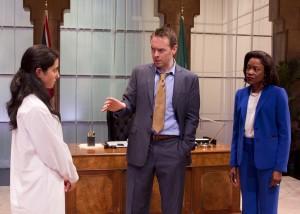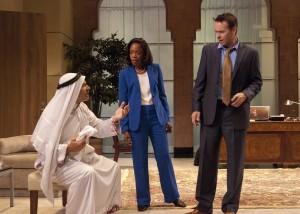
Consciously or otherwise, Theresa Rebeck, author of the play “Zealot” (currently enjoying a thrillingly thought-provoking world-premiere at South Coast Rep through Nov. 16), has borrowed a page from George Bernard Shaw.
The great Irish dramatist was famous for his didactic (some might say bombastic) style, tone and dramatic devices. Shaw loved to put brilliant, passionate people (preferably with polar opposite views) onstage together and watch them duke it out.
For him, “argument” was not something impolite to avoid, it was something to relish and encourage.
The effect for an audience is not unlike watching a good tennis match: Whichever player we’re rooting for, we can’t help admiring the terrific shots of his opponent, too.
Shaw the playwright was also Shaw the social reformer. He used the theater as a public forum for any number of pressing social, sexual and political ills.
One hundred years on, Rebeck’s use of Shaw’s devices are no less effective, and her theme, in “Zealot,” is no less urgent.
The time is now. The place is the ancient holy city of Mecca (now part of Saudi Arabia) where over three million Muslims come every year to ritualistically walk in the footsteps of the Prophet Mohammed. It is The Hajj — arguably the most sacred of all Islamic traditions.
Ann Haddad (the estimable Charlayne Woodard) is a mid-ranking official of the U.S. State Department. She has come to the office of British consulate Edgar Featherstone (the funny and frenetic Allan Smyth, who bears — not coincidentally? — a distinct resemblance to Tony Blair). It seems there have been internet rumblings about some sort of protest, and Ann was sent (or was she?) to provide “an American presence”.
Whatever that means. Edgar is understandably suspicious. This is, after all, his turf, and true to the time-honored rules of diplomacy, he lives to maintain the delicate balance of his nation’s presence within this ancient,

prickly, profoundly complicated culture.
Sure enough, there is trouble. Potentially huge. A group of women have defied Islamic law by removing their headscarves while praying, which has incited a riot leading to injury and death.
Young Marina (played with deep-felt honesty by Nikki Massoud) arrives, seeking asylum from the Americans, proclaiming herself a “witness” to what has happened.
Marina is deeply religious. She believes the women did the right thing (because some laws are “the laws of men, not God”) but confesses to no particular responsibility for her own involvement. That is because Allah spoke to her and told her it was right.
Ann (who is African American and a Muslim) has, it could be said, her own religion: a passionate belief that the barbaric oppression of women can and must be confronted head on. She sees Marina as a marvelous media opportunity… perhaps.
Edgar is an avowed atheist. His religion is that the world is as it is, and that any attempt to muck around with that reality will lead only to bloodshed and chaos. Though a loyal servant to the Crown, he is a realist, unapologetic that his government is really only interested in one thing: Oil. And it is his one and only job to insure that flows uninterrupted. Otherwise: Bloodshed.
The fabric of the story grows thicker: Is everyone telling the Whole Truth? Is Marina a conspirator, even a terrorist? Did Ann know about this event long before she came? Is Edgar really as much of a glib cynic as he seems to be?
The three clash, collide, but don’t, alas, ultimately come to much consensus. We come to care about all three of them. (Another brilliant Shavian device: if you get us to care, we’ll listen.)
Things do not end particularly well for any of them. (The story comes to a nail-biting climax that can’t be revealed here.)
We leave “Zealot” feeling, sad, shocked, even in a state of despair. But soon enough we feel a kind of elation too — from having shared some big ideas, however troubling, inside the precious, living community of a theater.
For tickets, visit www.scr.org.




